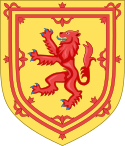Scottish republicanism
| Part of the Politics series |
| Republicanism |
|---|
|
|
| This article is part of a series within UK politics on the |
| Politics of Scotland |
|---|
 |
Category · Scotland portal
|
Scottish republicanism (Scottish Gaelic: Poblachdas na h-Alba) is an ideology based on the belief that Scotland should be a republic, as opposed to being under the monarchy of the United Kingdom. Usually, this proposal takes the form of an independent Scottish republic, but it is also occasionally found in discussions of changing the system of government of the United Kingdom as a whole in such a manner as to include an elected official as head of state.
History[]
Andrew Fletcher of Saltoun is one of the most prominent pre-Union advocates of a Scottish republic, based on agrarian and patriarchal principles.[1] He was a major inspiration to Scottish Enlightenment philosopher Adam Ferguson, whose republican ideals were penned down in An Essay on the History of Civil Society (1767).[1]
One of the foremost documentations of modern Scottish republicanism is the Declaration of Calton Hill, proclaimed on 9 October 2004, the same day that Queen Elizabeth II opened the new Scottish Parliament Building at Holyrood.[2]
In the run-up to the 2014 independence referendum, the Radical Independence Campaign advocated an independent Scottish republic with an elected head of state,[3] instead of the continued union of crowns established with the English monarchy, predating the Acts of Union.
Republicanism within the independence movement[]
Many people who advocate Scotland becoming a republic do so through their support for Scottish independence. This would entail Scotland becoming independent from the United Kingdom and instead of continuing the Union of the Crowns that predate the political union, a republic would be formed, with an elected president assuming the role of the deposed monarch.
Most of the major political parties and organisations that advocate Scottish independence also advocate Scotland becoming an independent republic. These include:
- Scottish Green Party
- Scottish Socialist Party
- Alba Party
- Scottish Republican Socialist Movement
- Solidarity
- Radical Independence Campaign
- RISE
Scotland's largest pro-independence party, the Scottish National Party, favours retaining the monarchy as a Commonwealth realm similar to the situation in other crown countries like Canada, Australia and New Zealand. However, the party has a number of prominent republican members, including Roseanna Cunningham, Christine Grahame, Chris Stephens and Rob Gibson.
British republicanism[]
Another concept for Scotland becoming a republic is through reform of the United Kingdom's constitutional status from a constitutional monarchy to a republican constitution. There is not an explicit link with British unionism, as this tends to advocate the Union of Crowns. This is a form of British republicanism which is supported by English politicians such as Dennis Skinner and Jeremy Corbyn, and advocacy groups such as Republic. There is not mainstream support for this concept in any Scottish political parties, and it remains a personal position, unlike support for an independent Scottish republic which does have party support. Adam Tomkins is an example of a republican who supports a reformed Britain without monarchy,[4] however his opinion shifted after being elected for the Scottish Conservative & Unionist Party who are ardent supporters of the monarchy.[5]
See also[]
- Politics of Scotland
- Labour for a Republic
- List of advocates of republicanism in the United Kingdom
- Republic (political organisation)
- Republicanism in the United Kingdom
References[]
- ^ a b van Gelderen, Martin; Skinner, Quentin (2005). Republicanism: A Shared European Heritage. Volume 2: The Values of Republicanism in Early Modern Europe. Cambridge: Cambridge University Press. p. 197. ISBN 9780521672344. Retrieved 28 June 2016.
- ^ Lorna Martin (10 October 2004). "Holyrood survives birth pains". The Guardian. Retrieved 28 June 2016.
- ^ "Radicals' new dawn with independence". The Herald. 25 November 2012. Retrieved 28 June 2016.
- ^ "Republic: Supporters". Republic. Archived from the original on 31 May 2009. Retrieved 31 May 2009.
- ^ "From Roundhead to Cavalier: how Tory Scottish Secretary's advisor wanted to axe the Royal family". The Herald.
- Scottish republicanism
- Republicanism in the United Kingdom
- Separatism in the United Kingdom
- Scottish independence